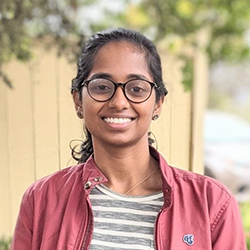 |
| Hari Priya Rajagopalan |
The Eastern States Section of the Combustion Institute (ESSCI) selected AE graduate student Hari Priya Rajagopalan for the Charles P. Fenimore Best Student Presentation award during the ESSCI Technical Meeting held at the University of Central Florida in Orlando. Hari Priya was selected out of 87 presenters from across the country.
“I was completely surprised by the award. It was my first ever as a Ph.D. student and it gave me so much encouragement towards my research," shared Hari Priya.
Hari Priya’s presentation focused on a numerical study on NOx emissions in H2/CH4 blends. “There is a lot of ongoing research being conducted in alternative fuels for gas turbines. There is a common notion in literature that the amount of toxic pollutant namely oxides of Nitrogen produced goes up with increasing H2 concentration while the fuel to air ratio is maintained the same. H2 inherently burns hotter which leads to a higher amount of NOx production. Therefore, in our study we wanted to maintain constant flame temperatures across fuel blends to understand the NOx production purely based on the H2 concentration,” Hari Priya explained.
Her research on alternative fuel is targeted at stationary gas turbines like those used in power plants to produce energy for day-to-day work. This is important because one of the biggest problems with conventional combustion is its production of toxic pollutants. “I believe the research in alternative fuel will help us move towards a sustainable future in terms of reducing pollutants; we might not be building the engine that is required to burn these fuels, but we are definitely building the knowledge base required to build such equipment in the future,” Hari Priya shared.
When she isn’t in the Ben T. Zinn Combustion Lab collaborating with other students and her faculty advisor professor Timothy Lieuwen, the Ph.D. student is serving her Georgia Tech community. She volunteers as a group leader in GT6000, a program that focuses on mentorship and community. She is also the president of the grad section of the Society of Women Engineers at Georgia Tech.
Hari Priya comes all the way from Chennai, India and moved to the United States to begin her graduate studies. Her curiosity for space science started early in elementary school through the stories of Kalpana Chawla. Chawla was the first female astronaut of Indian descent to go to space and lost her life during the Columbia Space Shuttle mission in 1997. Rajagopalan's interest in aerospace deepened when, in her high school, she was selected by the Indian Space Research Organization (ISRO) to visit their Propulsion complex for her work in a novel design of a reentry capsule. She later met her first mentor during a summer internship at the Indian Institute of Science. Her mentor was a Ph.D. student researching combustion who was applying to Georgia Tech and that is how she learned about her advisor and the Ben T. Combustion Lab at Georgia Tech. The rest is history. She plans to continue her research and serve in academia after she earns her Ph.D.
By Monique Waddell